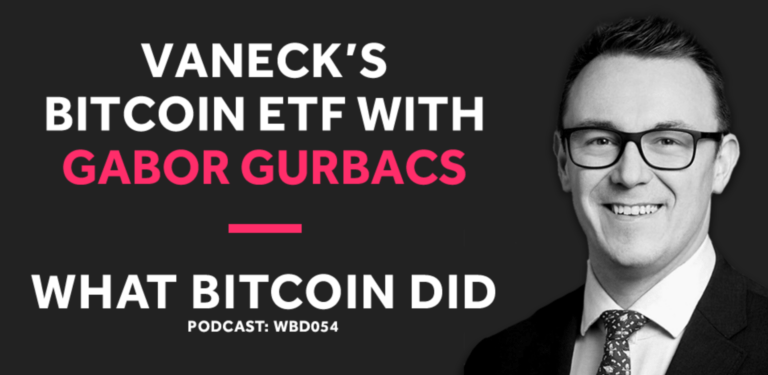The US Security and Exchange Commission’s (SEC’s) failure to approve of a bitcoin exchange traded fund (ETF) is “disturbing,” said Gurbacs Gurbacs, director of digital assets strategy at VanEck/MVIS.
Gurbacs recently spoke with Peter McCormack of the What Bitcoin Did podcast, talking about VanEck’s history, the journey of trying to approve a bitcoin product, and the problems of manipulation in all markets.
VanEck is attempting to get its SolidX bitcoin exchange traded fund (ETF) product to market, and the SEC is due to finally decide on the matter by the end of February after multiple delays since the summer. McCormack had only recently interviewed the other side of the bitcoin ETF fence, so to speak, talking to SEC commissioner Hester Peirce on the same subject.
Gurbacs described a company that has always been ahead of the curve. The family-owned firm produced the first mutual fund for US investors investing in defeated post-second world war nations, to help restart their economies, when no one else thought to; and in a gold equity fund before there was any interest in gold. VanEck was also, according to Gurbacs, largely responsible for making exchange traded funds (ETFs) a reality by offering new, transparent data capabilities.
Double Standards for Bitcoin & The Impossibility of a Perfect Market
Despite being obviously quite cheerful by nature, Gurbacs was frustrated by the inability, after years of work, to convince the SEC to sign off on the product. There is in his opinion a “double standard” that bitcoin products are fighting against to be approved, a standard that other asset classes have not met with.
Gurbacs is “kind of bummed out” from “years trying to – really doing a lot of work that regulators haven’t been doing, and [offering] all these solutions that do not exist even in the equity and commodities markets….”
“It's interesting […] there are public documents [showing that] a lot of commodity ETFs before – like freight futures, gold, silver, copper – have been approved without […] such a high level of requirements as a bitcoin ETF.
One of the SEC’s concerns, said Gurbacs, is the portion of the bitcoin market that is traded on foreign exchanges, thus falling outside the SEC’s ability to spot manipulation. But he strongly pushed back on the notion that this condition is in any way exclusive to bitcoin versus established asset classes – indeed the situation may be even worse for the latter.
Speaking for example on commodities markets, he said:
Commodities are largely invisible to the world, and […] trillions of dollars of commodity derivatives [are] over the counter traded in China – zero visibility to it, probably large companies amassing amounts of them […] trading it with some strategic vision in mind. Is that manipulation? Should we seize the oil markets, or, you know, commodities markets because this type of activity is happening overseas? No. […] That's a silly argument to single out bitcoin.
Gurbacs is hopeful that the ETF will go through, citing some key differences between VanEck’s product and the many other rejected bitcoin products. The VanEck product is physically backed with bitcoin (and of course, open to auditing for verification), uses a regulated price index of OTC trading (the MVIS spot index), and is institutionally focused in tranches of 25 bitcoin.
The team at VanEck will continue to request the product, in case it is rejected here, until it is approved. Looking to the future, after an ETF approval, Gorbacs is ready to move away from dealing with “regulatory headaches,” and move on to “[leveraging] the cool tech that is being built on bitcoin, to enhance financial instruments.” He said “I think that’s much more interesting, and we can produce more value for people, if we could just do what we do best.”








